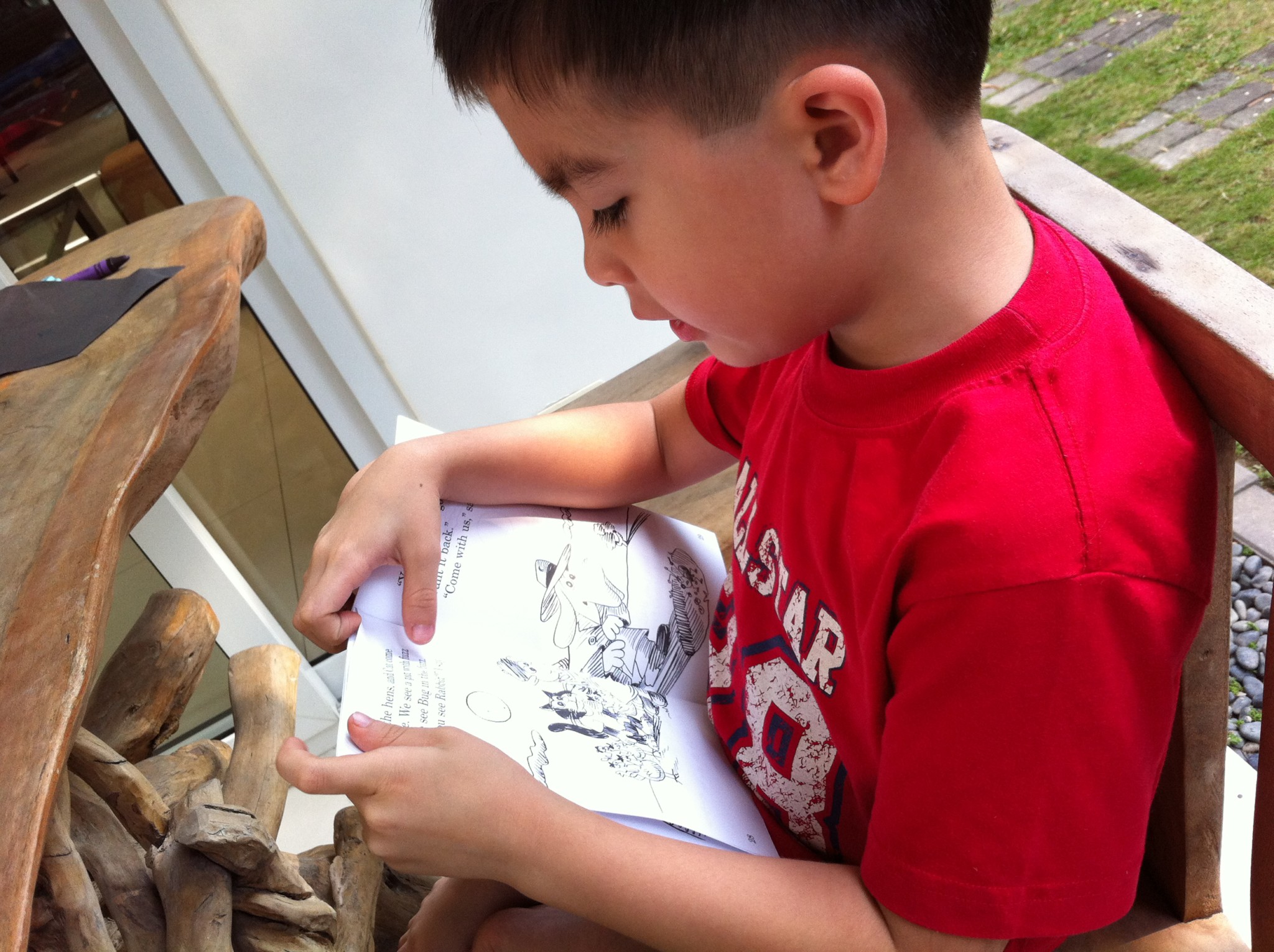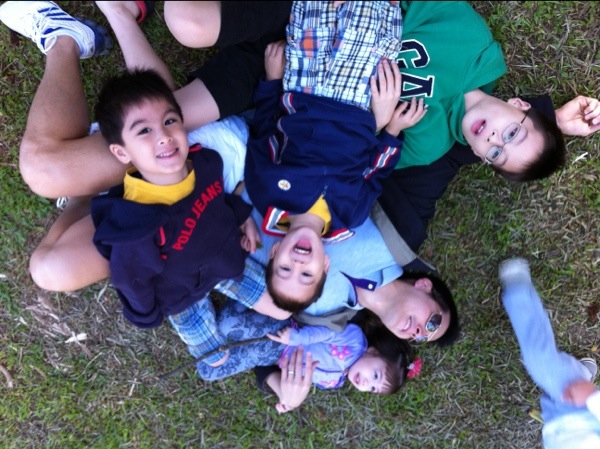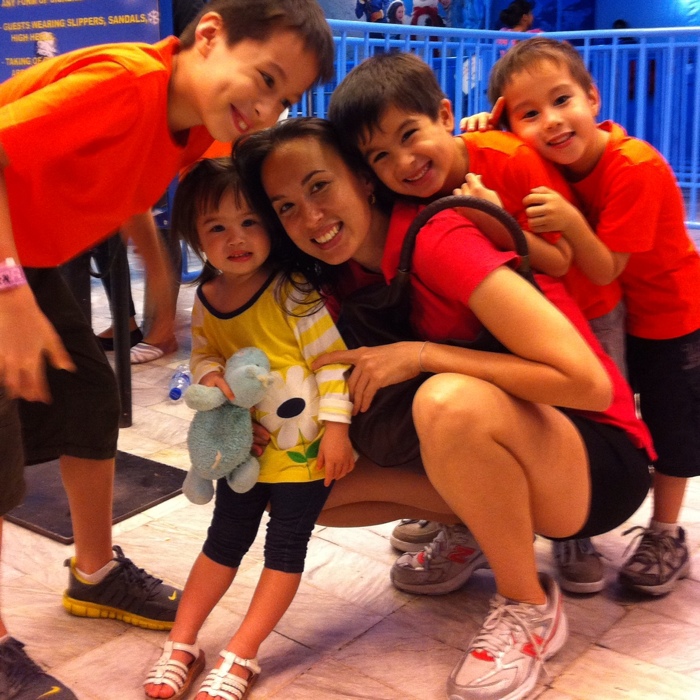Last weekend, I was in Cebu with Edric and the kids. No yaya. Wow. It was slightly crazy and wonderful at the same time. Part of the reason we were there was to talk about homeschooling. I was asked to give a testimony as someone who is in the trenches of it. That’s definitely me! So here is my take on homeschooling in a nutshell. I’ve broken up my testimony into two parts and taken bits and pieces from old posts to summarize What I like About Homeschooling and What I’ve Learned as A Homeschooling Mom
What I like About Homeschooling:
Free-flowing Lessons. Learning happens very naturally in the home. Teaching and training my children are not confined to a set period of the day. It doesn’t just happen in the study room of our home. I have four kids at different stages of learning so if I were to do a classroom set-up, I wouldn’t have enough time in the day to teach my kids like a conventional school would. Instead, I let my kids’ learning happen outside of textbooks and workbooks. Learning happens naturally through dialogue and discussion, hands-on experiences, modeling, games, reading and telling stories, socializing with family members or friends, and lots of creative play. I do give my kids workbook and textbook time, as well as writing exercises and tests. But, these conventional learning methods don’t dictate how, what, and when my children learn.
A typical day for our family would be the kids waking up at 7 AM and we have breakfast as a family. By 8:30 or 9 AM we start our lessons. With each child I will cover three to four subject areas. My older son, Elijah, is a pretty independent learner so he can do most of his work on his own. We will read History and Science together because he likes the discussion and interaction time we have when we go through these subjects. In the meantime, my second son, Edan, will be doing his lessons with lots of breaks in between. And when I’m preoccupied with my youngest son, Titus, Edan act as my teacher’s assistant or entertainer. He will help teach Tiana, my fourth child, and keep her busy. I work more closely with Titus because he needs one-on-one instruction. And after about 45 minutes he is done with his “academics” and will work with manipulatives or have free play time with his sister. Everyone is doing something productive between 9 and 12 noon, but it isn’t always sitting down at a desk. In the afternoons, the kids can read, pursue their hobbies, practice their violin, and rest. I rest, too!
A Customized Education – tailor fit to my child’s needs. At home, with one-on-one instruction, it is much easier for a parent to adjust to the learning needs of her child. Titus is a kinesthetic child but like my two older boys, he learned to read early because I modified my approach with him. Phonics instruction was kept short and sweet. We didn’t do too much writing until he was really ready. And I let him have lots of time to play with dough, scissors, glue, marbles…basically anything to help him develop his fine motor skills.
My simple philosophy for teaching my kids is this: All children are equipped to learn and they can develop a genuine love for learning, but a parent must be willing to discover and investigate how her child learns best, welcome the adjustment it requires on her part, and look to the Lord for the supernatural creativity, insight, wisdom and ability that this kind of inspired teaching requires.
At home, children have true play. They can engage in self-initiated activity without the pressure of outcomes. They are challenged to be creative, to conceptualize, and to problem solve while they play. And they have hours and hours to play! I really feel like they get to have an extended childhood that isn’t cut short by the over scheduling and time consuming homework that school-going kids have to deal with.
Learning along-side my children. I have never been excellent in math. I used to dislike it immensely until I started homeschooling my kids. When I became a “math teacher,” I had to re-learn math from the ground up. From pre-school math to upper elementary math (where I find myself now), I am both student and teacher to my kids. When Elijah was in 3rd grade, I peaked at the answer key in the back of his math book when we encountered a word problem I was stumped on (can you believe it?! 3rd grade?!) and he got really upset. He said, “Now you won’t solve the problem with me!” He enjoyed the fact that we solved the problems together. It didn’t matter to him that I wasn’t a math expert and this didn’t keep him from learning. He wanted me to learn along-side him. Nowadays, he uses Kahn Academy to teach himself math.
I call this approach to homeschooling the “teamwork” approach. It is experiencing the process with my kids, encouraging them and inspiring them to learn by making it fun. And often times, their definition of fun is having me beside them.
Cultivating relational intimacy between siblings / between parent and child. Adidas used to have a tag line for basketball. Basketball is a brotherhood. Well, for my boys, homeschooling is a brotherhood. My kids are growing up to be best friends and they often say they are. Homeschooling has a lot to do with it because they are together so often and have to work out their differences, defer to one another, and love one another unconditionally. God has really knit the hearts of my children to one another. They hold each other accountable for responsibilities like violin practice, reading their bibles and praying together. And they have each other’s backs. Elijah recently told me, “I protect my brothers and I stick up for them.” Someday, they will benefit from each other’s spiritual support and encouragement to weather the storms of life. Developing a loyalty to one another when they are young will have a lot to do with that.
My siblings and I were homeschooled for a time. And it proved to be such an amazing bonding experience, we remain close to this day. We enjoy getting together with our families, sharing meals and conversations, watching movies, playing games and sports, etc. My parents taught us to prioritize loving your family members before friends and this has carried on into our adulthood.
Dr. Gordon Neufeld, a foremost child developmental and clinical psychologist from Canada made this statement during a talk he gave on Why Home Education Works. “Homeschooling provides the optimum environment for a child to mature into a healthy and whole person who can achieve his fullest potential. Years of research and study show that a child was designed to be raised and educated at home because the most important element in a child’s development towards maturity is his attachment to those who are responsible for him – his parents.” He is not even an advocate of homeschooling. He is an advocate of child development.
He cites the following reasons:
- At home, children have continuity of contact with their parents. Schools separate children from their parents and foster competing attachments with peers.
- At home parents taken on the responsibility of pursuing their child relationally. This gives a child rest from the work of attachment. He doesn’t have to strive for the attention or affections of his parent. When children have to work for love or affection, they do not grow or mature.
- At home, a child faces less separation and less wounding (ideally) so that his heart stays soft and pliable. At school a lot of wounding occurs, especially among peers. This causes a flight from vulnerability and a child develops hardness of heart.
- At home, parents can support the maturity process. They can handle the stages a child goes through, the questions and the struggles.
I would like to add that at home, parents can continually assure their child, “nothing will separate you form my love…not your attitude, not your behavior, I love you no matter what, but because I love you, I am committed to helping you change and improve.”
Homeschooling has most certainly turned the heart of Edric towards our kids. And he has chosen to be very involved in their lives. This has been a special blessing for our family. The conviction to be a hands-on, intentional father came when Edric began to think about the goals of our parenting and homeschooling.
Influence. Dr. Neufeld also explained that children want to be like those whom they are attached to. They will give their heart to those whom they are attached to. They want to be known and reveal their secrets to those whom they are attached to.
He brought up this very important point: When did your child fall in love with you? When did you child give you his heart? We were never meant to deal with a children whose hearts we did not have. If you do not have the heart of your child, you will not have the context in which to bring him to his fullest potential. If you do not have his heart, you will not have his mind.
Homeschooling allows Edric and I to impact the hearts and minds of our kids because they are very much attached to us. Because we spend the most time with them, we naturally have the most influence, too.
Teaching a Biblical World-view. No education is neutral. No child is neutral. Every child has an orientation towards God or away from God. Edric and I don’t want our children to be bombarded with secular messages and worldviews that will turn them away from a God-ward orientation. So we filter what they learn through the word of God. We protect our children from wrong kinds of indoctrination by peers, teachers, school curriculums and systems that promote humanism vs. theism.
David Sant said, “All education is indoctrination into a religious worldview…All education is undergirded by presuppositions about the origin of the universe, the origin of man, the purpose of man, ethics government relationships between men, and the continuing existence of the universe in an orderly and predictable manner. It is an inescapable fact that all of these basic assumptions are fundamentally religious. Therefore we must view the schoolroom as the place where children are indoctrinated into the religion of their society. The school is, in effect, a temple.”
In a climate of postmodern thinking which has removed God from the picture and promoted the ideas of moral subjectivity, pluralism and relativism, there is a need more than ever before to teach our children the truths that God has given us in his word. When Elijah was 3, he asked us, “What if there is no God…what will happen?” It was a valid question. Who would have answered this for him if we weren’t around?
As parents, we need to be able to answer key questions that will impact our children’s belief system and determine their choices and actions: Who is God? Who Am I? What on Earth Am I here for? Edric and I aren’t willing to gamble our children’s future convictions by leaving this task up to others.
The faithfulness of God. We chose to homeschool in faith, in obedience to the Lord. We continue to do so, despite our limitations and imperfections to find that God is faithful. Every year that I teach the kids, I look back and think, how did we survive last year and manage to finish everything?! I’m always in awe of how God comes through for us. He is the one who makes my kids excited about learning. He is the one who helps them to learn. They are doing well inspite of me!






Hi Ms. Joy! May I ask your sons age and grade level? some homeschooler i know are too young for their grade level, makes me think if my child is on the right level:-( if we finished the material within 7 mos, TMA will allow us to enroll for the next level like SOTP?
thanks.
Esjay
Hi! I think if you finish within the same calendar year that you enrolled it may be hard to re enrol right away because it is still within the school year. However if you enrol June 2013 then finish by February 2014, then you can re enroll march 2014. But please verify with tma homeschool.
Tiana (3 years old) – informal homeschooling
Titus (5 years old) – kindergarten
Edan (7 years old) – 2nd grade
Elijah (10 years old) – 5th grade